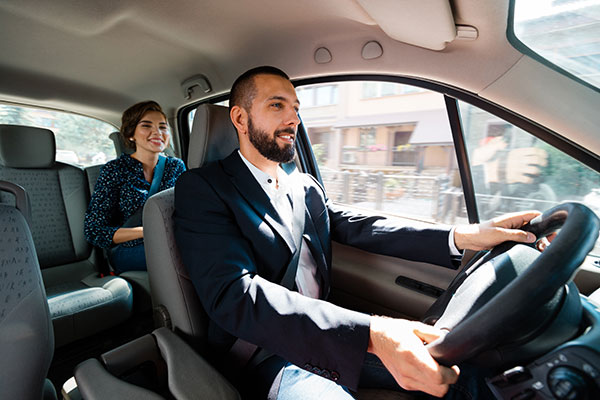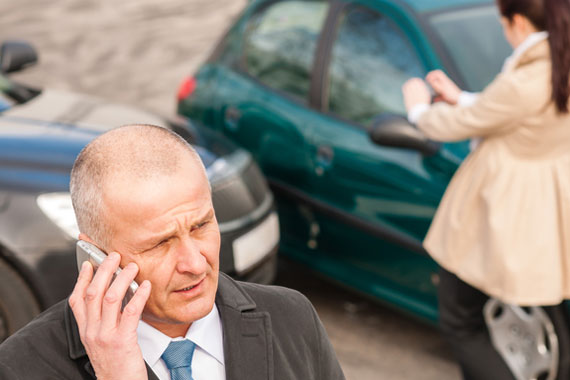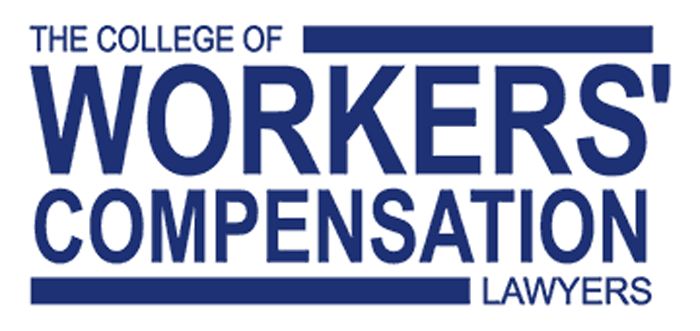While more common in larger cities like New York and Chicago, the familiar yellow taxi cab also has an extensive history in Indianapolis. These days, however, traditional taxi services in Indiana and nationwide have been largely overshadowed by “ridesharing” or “ride-hailing” companies.
Uber and Lyft decidedly dominate the ridesharing industry, accounting for roughly 69 percent and 31 percent of the market share respectively. In fact, Uber is so synonymous with ridesharing now that the company’s name is often used as a verb.
With such a fast-growing segment of motorists engaging in ridesharing—whether as a passenger or driver—there are inevitably higher and higher rates of motor vehicle crashes involving a rideshare vehicle, which leads to a whole host of complex legal questions and scenarios.
If you or a loved one were seriously injured in a crash involving an Uber or Lyft driver (or a vehicle from another ride-hailing service), it’s vital you consult with our Indiana car accident attorneys immediately in order to fully understand your rights. Since these crashes usually involve the rideshare company and their insurers, determining liability tends to be much more complicated and difficult.
As fierce and tireless advocates for injured car accident victims, our Fort Wayne attorneys are committed to helping auto wreck survivors secure their financial recovery. We have more than 25 years of experience representing injury victims across the state of Indiana, including families who have lost loved ones to deadly collisions.


Common Causes of Rideshare Car Accidents
Whether it involves a rideshare driver or not, a crash or collision can happen for a wide variety of reasons—including speeding, drunk driving, drowsy driving, aggressive/reckless driving, bad weather conditions and vehicle malfunction.
Distracted driving is an especially common cause of accidents involving Uber and Lyft drivers. The source of these distractions often include:
- Using the rideshare app to accept a new ride request
- Navigating using GPS
- Talking or interacting with passengers
- Changing a route
Are Uber and Lyft Drivers Insured?
Yes, but there are major caveats and gaps in coverage.
Generally speaking, rideshare drivers are not covered by their own personal auto insurance coverage whenever they are driving for commercial purposes (such as working for Uber or Lyft). Most of the time, accident victims must turn to the rideshare company for compensation.
Uber, for example, claims to provide third-party liability coverage worth at least $1 million per accident whenever a driver is traveling to pick up a passenger after accepting a request and during Uber trips while the passenger is in the vehicle. However, this coverage drops to $50,000 per person/$100,000 per accident for bodily injury and $25,000 for property damage whenever the Uber driver isn’t carrying a passenger or hasn’t accepted a ride request.
Lyft has a similar insurance policy in place.
The trick is that rideshare companies typically don’t provide coverage if the driver’s app is off. Many Uber and Lyft drivers use their vehicles for personal reasons too. In such cases, accident victims must turn to the at-fault driver’s personal auto insurance policy for compensation—even if they are an Uber or Lyft driver.
For example, say a bicyclist is hit by an Uber driver who had the app turned on but hadn’t accepted a ride request yet. The driver was distracted by trying to find his next ride and didn’t see the cyclist. The cyclist was thrown from her bike and suffered a traumatic brain injury. Because the driver hadn’t accepted a ride request and didn’t have any passengers, Uber will only pay up to $50,000 in damages to the cyclist. However, her TBI treatment alone costs $100,000. In this example, the injured cyclist may have to pursue additional compensation by suing the at-fault driver or the rideshare company.
Understand this:
Just because Uber and Lyft have insurance coverage for up to $50,000 or $1 million depending on the circumstance, doesn’t mean they will readily pay out your claim in full. In contrast, these companies and their insurers are often willing to go to great lengths to deny claims or settle for as little as possible in order to maximize their bottom line.
This is exactly why it’s important to have an experienced accident attorney on your side who can aggressively represent your best interests and fight to ensure that you’re getting a fair shake.
Injured By a Rideshare Driver
In a standard car accident involving 2 private citizens, the responding police officer and each party’s insurance company conduct investigations and interviews to determine liability. Whoever is determined to be at fault for the crash is responsible for damages—to be paid out of the liable person’s insurance policy.
If the at-fault driver is uninsured or the extent of damage and injury exceeds what their insurance policy covers, then an accident victim may file a car accident lawsuit against the at-fault driver for full compensation—so long as they are less than 51 percent at fault for the crash. This is known as the “51 percent rule” of Indiana’s modified comparative negligence system.
If you were hit by a driver who works for Uber or Lyft, you may be able to simultaneously seek justice and compensation from multiple entities and third parties, such as:
- The rideshare driver
- The rideshare company (Uber, Lyft, etc.)
- The driver of another vehicle
- The manufacturer of a vehicle
- State and local municipalities
Rideshare companies typically take legal responsibility for their drivers while they are transporting passengers or are en route to pick up passengers with the app turned on. This means you should be able to file a claim against the rideshare company’s insurance if you were injured by an Uber or Lyft driver as a passenger, bicyclist, pedestrian or driver.
Since your rideshare car accident claim will probably involve a third party, there will likely be more insurance companies involved that, unfortunately, will go to great lengths to try to reduce or deny compensation.
Injured as an Uber or Lyft Passenger
If you were hurt in a car wreck while riding in an Uber, Lyft, taxi or another rideshare vehicle, you can file a claim or lawsuit against the rideshare company to receive compensation for medical expenses, lost wages, pain and suffering and other damages—regardless of who was at fault for the accident.
If another driver was responsible for the crash, then you may also be able to pursue a claim against the at-fault driver.
However, if your Uber or Lyft driver was liable for the collision, the only option will probably be to seek compensation from the rideshare company since the driver’s personal auto insurance policy likely doesn’t cover them while driving for commercial purposes (such as transporting passengers for a fee).
Crash While Driving for Uber or Lyft
Uber and Lyft claim that their drivers are “independent contractors.” Since they are not technically employees, rideshare companies aren’t yet required to provide the benefits given to regular employees such as health insurance, paid sick days, overtime pay and workers’ compensation.
That said, in 2018 Uber launched its “Optional Injury Protection” program as a supplemental program to workers’ comp, providing some coverage for work-related injuries. Available in most states, this optional program provides some compensation for certain work-related medical expenses, lost wages and death for drivers who are logged into the app, picking up passengers and transporting passengers.
If rideshare drivers are injured in a car accident while working for Uber and Lyft, and they didn’t opt into a supplemental driver protection program offered by their company, then they may have to turn to their own health insurance policy to help cover medical expenses—and they might be out of luck when it comes to property damage and lost wages. A driver’s personal auto insurance policy usually won’t cover them if they were involved in a crash while driving for commercial purposes.
According to Indiana law, motorists are required to report a car accident when:
- A wreck traps someone in a vehicle and/or results in injuries or death.
- A crash causes at least $1,000 in property damage.
- An accident involves unoccupied or unattended property, and the owner cannot be tracked down. If the crash involves a parked vehicle and the owner cannot be found, leaving a note with your name, address and registration number (rather than calling police) is legally acceptable.
What to Do After a Rideshare Car Accident
Following a crash involving an Uber or Lyft, you should take many of the same steps as you would in any other type of collision. These steps include:
Dial 911 to report the accident
Indiana law requires any car crash that involves the injury, death or entrapment of any person involved in the wreck to be reported. In addition, you must report any car accident that results in property damage (not counting the vehicles involved).
Whether you were a driver or passenger, be sure that you or someone else dials 911—or if the accident was minor and nobody was hurt, you can alternatively contact a local non-emergency line. If the crash happened in or around Fort Wayne, you can dial (260) 427-1222 to reach the police desk or (260) 449-7535 for the Allen County Sheriff’s Office.
Remain at the scene
If possible, leave your vehicle (and any other wreckage) where it sits until photos are taken and/or police have a chance to investigate the crash scene. If the accident occurs in the path of traffic, move to the shoulder (or a safe area nearby) and wait at the scene until the police arrive.
Even if you were a passenger and your rideshare driver was involved in a wreck, don’t leave the scene until a responding officer gives you the all-clear. Leaving the scene of an accident you’re involved in as a driver is considered a criminal “hit-and-run” offense in Indiana, and leaving as a passenger can negate your rights to compensation down the road because it wasn’t documented at the time of the crash.
Seek medical attention
If you feel pain, don’t try to move or else you might further injure yourself. Wait for emergency responders and paramedics to arrive. Don’t worry about the remaining steps right now—just focus on your health. We’ll help sort out the details later.
Even if an ambulance isn’t needed and you feel okay, be sure to get checked out by a doctor as soon as possible after the accident. This is an important step for getting an accurate assessment of your injuries (and for receiving the treatment necessary to prevent additional health complications).
Gather information and evidence
As you wait for the police to arrive or for them to finish their report, take as many pictures and videos of the damages as possible, from various angles, if you’re able to do so safely and without further causing injury.
In addition, don’t forget to exchange insurance and contact information with the other involved motorist/s. Be sure to get their full name, address, phone number, name of their insurance company, name of the rideshare company they work for, policy number, driver’s license number and license plate number. If there were bystanders or other drivers who witnessed the crash, try to take down their names and contact information as well.
Notify your insurance company
After you leave the crash scene, file an accident report with your auto insurance provider — even if you weren’t responsible for the wreck. Don’t wait too long to do this because your policy may have strict deadlines for reporting crashes.
On top of these steps, there may be some important additional things you may need to do following a rideshare car accident in Indiana in order to protect your rights. These steps might include:
- Filing a claim with the rideshare company (Uber, Lyft, etc.)
- Calculating the full extent of your damages
- Negotiating a fair settlement with both the rideshare company and insurance company
- Suing the rideshare company or driver for pain and suffering
- Contacting a lawyer near you who specializes in rideshare car accident cases
Why Contact an Indiana Car Accident Lawyer
Uber, Lyft and other ride-hailing companies have deep pockets and dedicated teams of lawyers whose sole job is to save the company money by reducing or denying accident claims from its drivers, passengers or other motorists who were hurt in a crash involving a rideshare driver. For accident victims, this means it can be much more difficult to secure full and fair compensation for your crash injuries when it involves a rideshare driver.
When pursuing compensation against a rideshare driver and/or company, it’s vitally important that you seek advice from an attorney who is knowledgeable about these complex cases. By understanding how the process works, as well as the countless tricks insurers and rideshare companies often pull to try and reduce or deny just compensation, your attorney can properly prepare you for what is to come, avoid potential pitfalls and secure maximum compensation from all at-fault parties.
If you or someone you love has been hurt in an auto crash, contact our Fort Wayne car accident lawyers today to get answers about your potential claim. Our attorneys are diligent, dedicated problem solvers who are skilled at partnering with clients to understand their specific legal needs and help them achieve their legal objectives. With us in your corner, you can count on receiving superior representation and effective advocacy at every phase of your claim.
We’ve helped and satisfied hundreds of clients. Our history of providing the highest quality legal services —and delivering exceptional results—has earned us 5-star ratings on Facebook and Google. From offices in Fort Wayne, we are proud to represent clients throughout Allen County and the state of Indiana.
REVIEWS FROM OUR CLIENTS
Great to work with. Went above and beyond to help us. Very professional and personable. They cared about me and getting done what was needed. Would highly recommend this firm. - D.P.
Always on top of the process and keeps in contact. Communication to me is key regardless if they are making progress or not and they were always answering the phone or returning calls promptly and answering any questions along the way. Top notch and while I hope to never use them again, I highly recommend them. Excellent and phenomenal! - H.H.
Roger went above and beyond for me and got me the results I needed. I'm extremely satisfied with how things turned out! Hopefully, I will not have to visit the office again; but, if I do need a lawyer, I know where to go! - T.





 744 E Till Rd, Suite 102
744 E Till Rd, Suite 102

